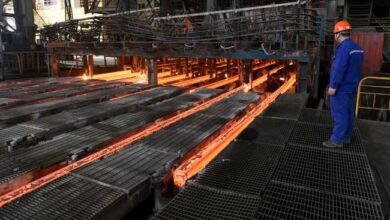
Steel traders have warned that imposing protectionism fees on their imports indicate a possible return to market hegemony for influential steel tycoon and ex-president Hosni Mubarak’s strongman Ahmed Ezz.
The traders said price hikes that coincided with Ezz’’s exit from prison, where he had been held for trial over financial corruption and monopolistic practices, mean the former National Democratic Party secretary could revive his dominance over the steel market.
Some observers working in the industry said the government’s decision to reduce local steel prices could be a “tactical” measure to alleviate consumer’s fears from price increases before actual surges, maybe up to LE1,000 per ton, occur just like 2013.
Ahmed Al-Zeiny, head of the building materials division at the Federation of Egypt Chambers of Commerce, said the decision to impose imports fees was meant as “a compliment to factory owners at the expense of citizens”. He told Al-Masry Al-Youm that imported steel rates fell by LE0.50 per ton, currently standing at LE4000 per ton.
Zeny believes Ezz’s return caused changes to the market, pointing to price increases that occurred on the day Ezz was released from prison.
"The government is repeating its past mistake when it imposed protectionism fees for 200 days before investigations proved there was no dumping of the market. The decision was then revoked, importers got their money back and factories recorded huge revenues as prices soared by LE1,000 per ton. The only loser was the consumer who had to bear the increase and was never compensated.”
Tarek Abdel Azeem, a steel importer, said reducing steel prices was merely a “tactical” step by producers that seeks to curb the fears of consumers who would push for purchasing big quantities. Abdel Azeem predicted prices to surge within few months, revealing that investigations would prove during the next period that producers had provided anti-dumping authorities
Soad Al-Deeb, head of the Consumer Protection Agency, warned against using import restraints to increase local prices. She called for applying the anti-monopoly law by setting a mandatory rate for steel in case prices soar extraordinarily. She said she fears the companies’ decision to reduce prices following the imposition of fees was a temporary measure.
Edited translation from Al-Masry Al-Youm




